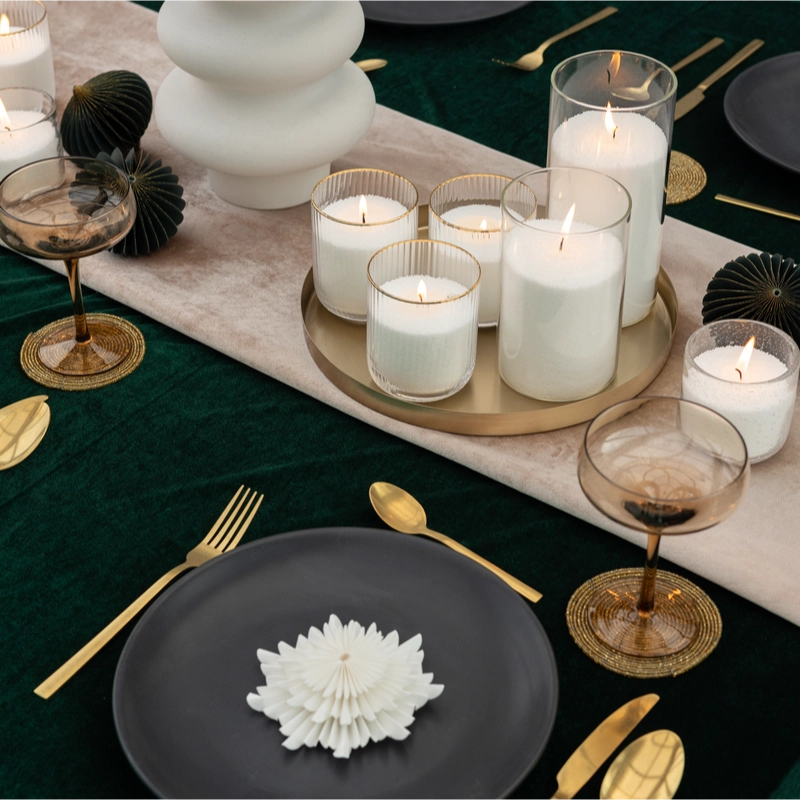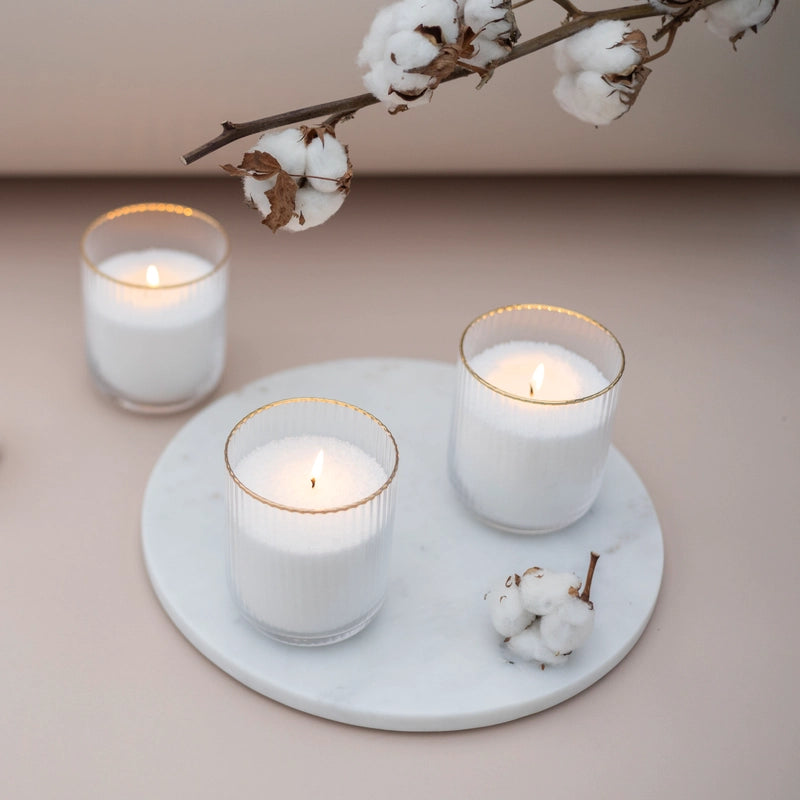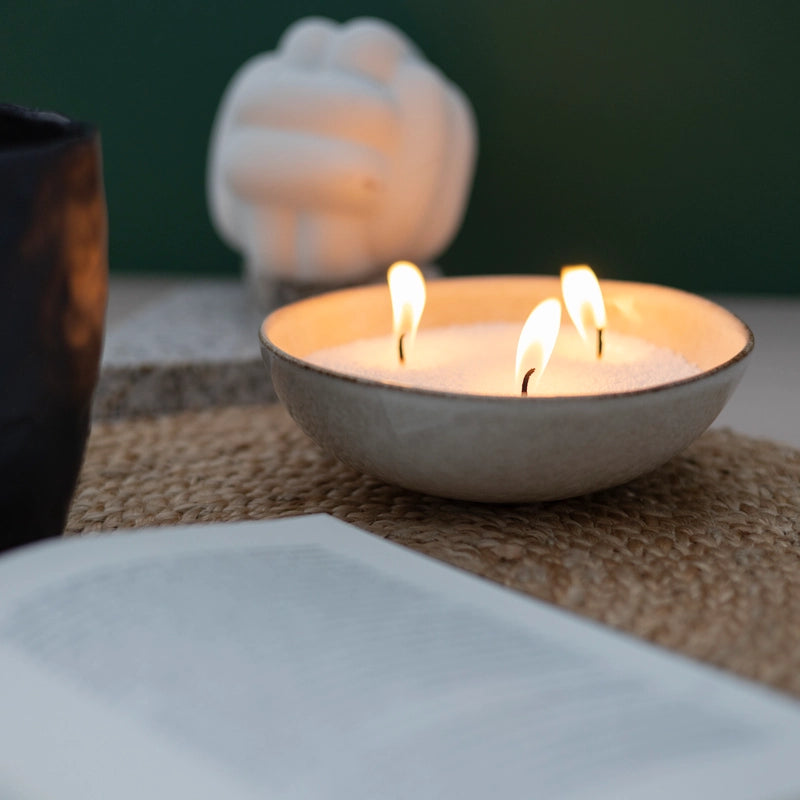Candle Safety Tips: Illuminate Your Space Safely
Candles can transform any space into a cozy haven, but the allure of their flickering flames comes with potential hazards. It's crucial to understand and practice candle safety to prevent accidents and keep your surroundings secure.
In this article, we'll explore essential tips to keep your candle-lit moments enjoyable without compromising on safety.

1. Selecting the Right Candle
The journey to a safer candle-lit experience starts with choosing the right candle. Avoid candles with excessive additives or high levels of fragrance, as these can increase flammability. Paraffin wax is a byproduct of crude oil and contains carcinogens which cause air pollution which we inhale.
If you have found black soot built up where you have been burning a candle or have a horrible smell of burnt tyre after putting the candle out, then you will want to avoid candles made with Paraffin Wax and Candle Wicks made with lead cores.
2. Choosing Safe Candle Holders
Equally important is selecting appropriate candle holders. Ensure they are made from sturdy, non-flammable materials. Place them on a flat surface, away from curtains or other flammable items, to reduce the risk of accidental fires.
3. Keep Candles Away from Flammable Items
Maintain a safe distance between burning candles and other objects. It's easy to underestimate the heat emitted by a candle, so be vigilant about the proximity of surrounding items. A simple rule is to create a clear, uncluttered space around your candles.
4. How to use Candiluna Candles
Trimming Candle Wicks
Regularly trim candle wicks to prevent uneven burning and excessive smoke. Wick trimmers are handy tools for maintaining the optimal length. This not only enhances the candle's performance but also reduces the risk of sparks or floating embers.
We suggest you have 5mm visible above wax level.
Lighting the Wick
Make sure your wax is free from debris.
Place the Candle in a safe place to burn, on a level surface and away from drafts (open windows, fans, air conditioners).
If you have children or a pet, choose a spot that is out of reach. Never place a candle by an open window and never near curtains and/or blinds.
Light your candle with a long match or bendy candle lighter (this prevents the need to tilt the glass when lighting).
Monitoring Burning Candles
Never leave a burning candle unattended. Whether you're enjoying a quiet evening or hosting guests, make sure someone is always present to keep an eye on the candles. For added peace of mind, consider using candle timers, which automatically extinguish candles after a set time.
Typically, wicks burn around 1cm per hour. If you burn your candle for 4 hours or more, the wick is likely to mushroom due to excessive carbon build up, which makes the flame unstable and increases the height of the flame.
Extinguishing Candles Safely
Extinguishing candles might seem straightforward, but doing it properly is crucial.
After 4 hours, extinguish the flame. Instead of blowing out the flame, use a snuffer or gently dip the wick into the wax and then straighten it. This minimises the chances of hot wax splattering and reduces the risk of igniting nearby objects.
5. Understanding Candle Labels
Take a moment to read and follow the instructions on candle labels. This includes information on burn times, recommended usage, and safety precautions. Look for candles with safety certifications to ensure you're purchasing a reliable product.
6. Addressing Allergies and Sensitivities
For individuals with allergies or sensitivities, opting for unscented candles or those labeled as allergen-free is advisable.
Candiluna candles are 100% plant-based and not made from paraffin wax which is a by product of making gasoline. They are soot & black smoke free with no additional chemicals added to make it less likely that burning these candles will cause an allergic reaction.
This ensures that you can enjoy the ambiance without triggering any adverse reactions.
Frequently Asked Questions About Candle Safety
-
No, the safety of candles depends on their materials and how they are used. Plant based wax that are not chemically manufactured are generally safer.
-
It's not recommended to leave a candle burning unattended, especially overnight. Always extinguish candles before going to bed.
-
Use a fire extinguisher if available. If not, use a fire blanket or water to extinguish the flames. Call emergency services immediately.
-
Yes, candles can be used during power outages, but exercise caution. Keep them away from flammable materials and never leave them unattended.
-
Yes, but be cautious. Keep candles out of reach of pets, as curious animals may knock them over.
-
While it's common to group candles for a more significant impact, ensure they have enough space between them to prevent excessive heat buildup. Follow the manufacturer's recommendations.




